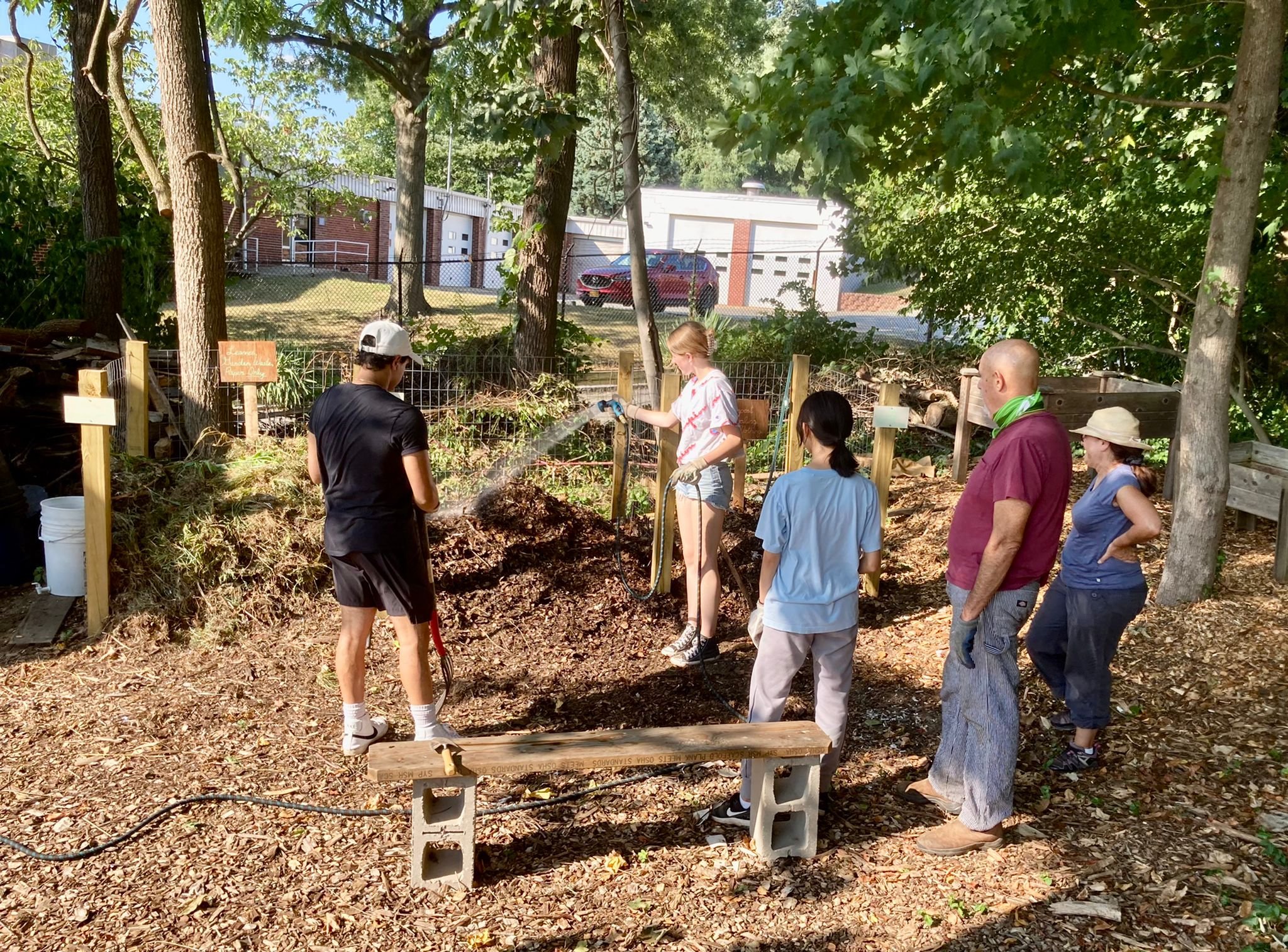Bokashi-based Community Composting : First Year Reflections
Paul Merkelson, founder of the Food Scrap Recycling Program at the ReWild Garden at Dodge, reflects on his first year of creating an managing the community compost.
BACKGROUND
We just passed the one year anniversary of the Food Scrap Recycling Program. There are currently 9 households recycling their food scraps. The food scraps are used to make compost which is then used in the ReWild Vegetable Garden at Dodge.
RESULTS
Food scraps recycled – approx. 24 buckets @ 30lbs/ bucket = 720 lbs
Compost produced – 4 bins @ 1 cu yd / bin = 4 cu yd. We covered the vegetable beds, (approx 500 sf) with 2 cu yds in the spring and 2 cu yds in the fall
Note: We do not weigh the food scraps or the finished compost. Estimates are based in the average number of buckets filled with food scraps, the average weight of a filled bucket, and the approximate volume of a bin of finished compost.
THE PROCESS
When we began in September 2021, we wanted to create a process that was easy as possible for the participants. Unlike the typical community compost, the participants do not….
Paul ensures students adequately water compost pile
Pay a fee
Have to separate meat and dairy from plant based food,
Bring their food scraps at a designated time,
Bury their food scraps in the compost pile.
Turn the pile or perform any other tasks to maintain the compost.
All that they have to do is…
Summer Students turning compost as Paul explains how easy the process is
Bring their food scraps, to Dodge anytime during daylight hours
Put it in the designated bucket
Sprinkle in a little Bokashi bran,
Push down the food scraps and
Seal the lid on the bucket.
Measuring the temperature of the pile
MANAGING THE FOOD SCRAP RECYCLING PROCESS AND COMPOST
The food scraps are mananged primarily by two volunteers — Paul Merkelson and Mazhar Akhtar.
We use a process of pre-composting the food scraps first using a technique called Bokashi. Read this blog to learn about the Bokashi technique that is pretty much odor free, can be performed indoors or outdoors and, best of all, keeps rodents and other critters from accessing all that free food. After the pre-compost is done (typically 3 weeks) we move the fermented food waste to the compost bin.
Spreading compost on beds before winter
The Bokashi process starts in a primary 5 gallon bucket for depositing food scraps and a back up bucket for the participants to use if the primary bucket is full. The buckets are kept in the horse barn. On average twice a week, one of us will check the buckets and replace if full, and put the full buckets aside to fully ferment. We check to see that the food scraps have been chopped up and sprinkle more bran if needed. We also clean and tidy the area when needed.
Every few months we will build a new compost pile in one of the bins behind the horse barn. Inputs include the fully fermented food scraps, leaves, wood chips, cardboard and garden waste. Summer interns have helped with this process. The compost pile is turned and watered every few days during the initial 2 weeks and about once every month after that. It takes about 3 months for the compost to mature. This is a batch hot compost process. The pile is built, temperatures above 130 degrees F are usually reached in a few days and maintained for a few days. This process kills most seeds and pathogens. (Note: as opposed to a “Batch” process , a “continuous” compost process adds material on a on-going basis and typically does not reach the higher temperatures.)
Time required to manage
Check and replace buckets : 2 x/wk, 5-15 minutes per visit
Build compost pile: every 2–3 months, : 30 minutes, excluding collection of materials
Turning and watering compost pile: 2x/wk for 2 weeks every 2-3 months, : 20 minutes
Collection and preparation of materials: as required. This involves moving and chopping garden waste, collecting leaves, tearing cardboard, etc. summer interns helped with this work on site.
Mulched Beds all set for Winter
STRENGTHS , WEAKNESSES, OPPORTUNITIES, THREATS
STRENGTHS
· Simple and easy method to recycle food scraps
· Easy to manage
· Effectively decomposes food scraps
· Produces rich compost
· Fermented food waste can be kept in buckets indefinitely, which allows compost to be built at any time after the 2 week fermentation period
· Recycles yard and garden waste from Dodge property
WEAKNESSES
· Leaves, which are a preferred “brown” material, are not available on site, and can only be collected off site in late October and early November
· The bucket lids are sometimes difficult for the participants to secure properly
· Participants do not always chop their food scraps
· Participants do not always communicate when buckets are full or to provide feedback when requested
OPPORTUNITIES
· Expand the number of households participating
· Expand education about food scrap recycling and composting
· Involve more ReWild volunteers and summer interns in management
· Produce a more fungally rich compost for use with native plants. This could be done with little or no food scraps, basically a cold compost with wood chips and garden and yard waste
THREATS
· Animals – Squirrels , geese and raccoons are often on site (irrespective of the composting). The buckets were moved into the horse barn because raccoons (probably ) tipped over the buckets. Sometimes there is evidence of animal activity around the compost piles. So we do need to stay vigilant as these creatures are capable of learning and working around our systems.
· Producing compost is dependent on a sufficient supply of food scraps. This last year, the 9 households have provided enough food scraps to produce enough compost for the Dodge garden. However, if several households dropped out and were not replaced, there might not be enough food scraps to produce enough compost for the vegetable beds.
YEAR 2 OBJECTIVES
Engage more volunteers who can contribute to the labor and the compost!
Coordinate food scrap recycling and compost with ReWild plans for Dodge garden
Create informational and and instructional signage
Further Educate and train participants on Bokashi bin etiquette (remove food labels, chop food scraps, secure lid, communicate status of bins, provide feedback)
Explore feasibility of creating similar food scraps recycling at other locations






